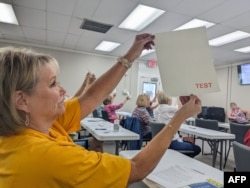Last-minute change in US swing state’s election rules alarms some

In the town of Leesburg in the U.S. state of Georgia, slightly more than a dozen election workers sit at card tables, each thumbing through stacks of 50 blank pieces of paper, practicing counting ballots by hand.
With the U.S. presidential vote only weeks away, the Georgia State Election Board, led by a pro-Donald Trump majority, passed a controversial requirement in September that counties manually hand count their ballots, a move that has caused alarm in the closely watched swing state.
Veronica Johnson, who is leading the training session as the Lee County director of elections and registration, says hand counting the ballots is unlikely to pose major operational problems in her small county.
But logistics are far from election officials’ only concern.
Georgia officials from both sides of the political aisle say the count is not only superfluous — machines already count the ballots — but also a potential tool to sow doubt by slowing the process and creating space for disinformation should discrepancies arise via error-prone human counting.
“I don’t feel it’s necessary. I have no problem saying that. I think that at our precincts here in Lee County we’re already balancing our numbers,” Johnson told AFP.
The change is all the most notable given Republican candidate Trump’s alleged election tampering in the state in 2020, pushing for Georgia officials to “find” enough votes to overturn President Joe Biden’s victory.
‘Misguided’
Lee is among Georgia’s 159 counties, which encompass major metropolitan areas such as Atlanta and rural regions like the area surrounding Leesburg, with populations ranging from majority white to majority Black.
Like many of its rural counterparts, Lee County voted heavily in 2020 for Trump, who received 72 percent of its votes.
Poll workers such as those at the training will be stationed across the county’s 10 voting precincts on November 5, when U.S. voters choose between Trump and his Democratic rival, Vice President Kamala Harris, in addition to candidates in hundreds of down-ballot races.
Because of lawsuits, Johnson is unsure if hand counting will actually happen.
“Honestly, every election director I know really just wants to serve the people and not get bogged down by the political ramifications,” she said, emphasizing that ballots are already counted by machine three times.
Calling the rule change “misguided,” Georgia’s Republican Secretary of State Brad Raffensperger said that “activists seeking to impose last-minute changes in election procedures” only “undermine voter confidence and burden election workers,” while Georgia’s Republican attorney general has stated the new rule is likely illegal.
The Democratic National Committee and the Democratic Party of Georgia sued to block the rule last week with the Harris campaign’s backing.
‘Untrusting’
The state election board passed the rule by a three-to-two vote — those in favor being staunch Trump backers praised by the ex-president as “pit bulls” fighting for “victory.”
Along the same three-to-two lines, the board passed another rule in August allowing county election boards to conduct a “reasonable inquiry” before certifying results.
Like the hand count requirement, the measure is being challenged in court, with critics particularly worried about the vagueness of the word “reasonable.”
Mitchell Brown, director of the election administration program at Auburn University in Alabama, told Agence France-Presse that such a rule is unnecessary given that election officials “have meetings regularly where they go through the documentation and the information with the certifying body.”
“The bigger, more interesting question to me is, what happens if a body chooses not to certify?”
Back in Lee County, Donna Mathis, who has served as a poll worker since 2018, noted that the “country is divided so much.”
Asked about the hand count and reasonable inquiry rule, she said, “the hand count doesn’t bother me” given how quickly they were able to tabulate the votes.
But “I think you can inquire too much, it ties things up,” she added. “People are just so untrusting anymore that they question everything.”





